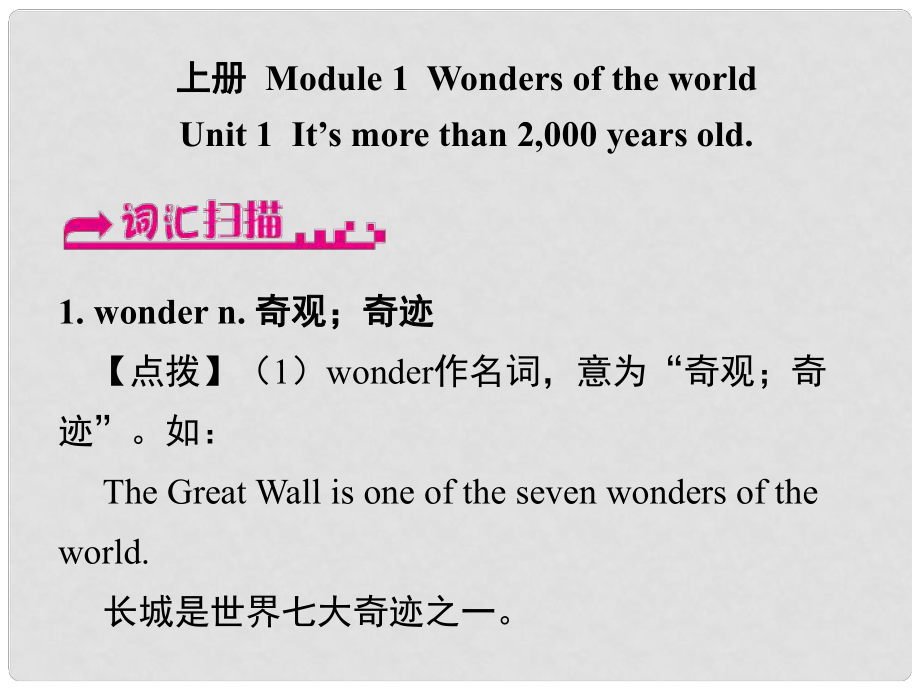《浙江省嘉興市秀洲區(qū)九年級英語上冊 Module 1 Unit 1 It’s more than 2,000 years old課件 (新版)外研版》由會員分享����,可在線閱讀,更多相關《浙江省嘉興市秀洲區(qū)九年級英語上冊 Module 1 Unit 1 It’s more than 2,000 years old課件 (新版)外研版(17頁珍藏版)》請在裝配圖網上搜索���。
1����、上冊上冊 Module 1 Wonders of the worldUnit 1 Its more than 2,000 years old.1. wonder n. 奇觀��;奇跡奇觀�����;奇跡【點撥】(1)wonder作名詞�,意為“奇觀;奇跡”��。如: The Great Wall is one of the seven wonders of the world. 長城是世界七大奇跡之一���。 其常用的固定句型有: 1)Its a wonder that.奇怪的是。如: Its a wonder that she is still alive. 奇怪的是她還活著�����。 2)Its no wonder tha
2、t.意為“難怪”����。如: Its no wonder that they wont come. 難怪他們不會來。 (2)wonder作動詞���,意為“想知道��;對感到懷疑”���。常見的用法有: 1)后接who, what, why, where等引導的賓語從句。如: She wondered what the child was doing. 她感到疑惑���,孩子究竟在干什么���。 2)后接if或whether引導的賓語從句,常用來表示一種委婉的請求或疑問����。如: She wondered whether you were free that morning. 她想知道你那天上午是否有空。3)后接“疑問詞不定式”構
3���、成的短語����。如: Im just wondering how to do it. 我正想知道該怎樣做那件事。2. join in 參加(某種活動)����;加入到參加(某種活動);加入到【點撥】join in后跟表示競賽����、游戲等活動的名詞。有時不跟賓語����,表示“參加進來”。 【延伸】join指“參加(某個組織)����;加入到(某些人中)”。join sb.與join in sth.可以合二為一�,構成固定搭配join sb. in (doing) sth.。如: Do you want to join me in a swim? 想和我一塊去游泳嗎��? Zhao Jun joined the army five y
4�、ears ago. 趙軍5年前參的軍���。3. in ones opinion 按某人的意見�;據某人看來按某人的意見;據某人看來【點撥】in ones opinion意為“按某人的意見����;據某人看來”。如: Who, in your opinion, is the best football player in the world today? 在你看來����,誰是當今世界上最好的足球運動員?4. millions of 大量的�����;無數(shù)的大量的���;無數(shù)的【點撥】millions of意為“數(shù)百萬的�;無數(shù)的”����,表示不確切的數(shù)目時,million須用復數(shù)形式��。如: It produces electricity
5、for millions of people in China. 它為幾百萬中國人供電���。 【延伸】(1)million可用one, two, three, several等數(shù)詞來修飾���,表示確切數(shù)目,此時million用單數(shù)形式����。如: Albania has around 3 million people. 阿爾巴尼亞大約有300萬人口。 (2)與million有同樣用法的詞有:hundred, thousand, billion等���。 1. And I think the Giants Causeway is the most fantastic natural wonder. 我認為巨人之路是
6��、最神奇的自然奇觀���。我認為巨人之路是最神奇的自然奇觀。 【點撥】此句句型為:.is+the+形容詞最高級+可數(shù)名詞單數(shù)(+其他)���,意為“是最的”�。如: Helen is the most beautiful girl that I have ever seen. 海倫是我所見過的最美麗的女孩�。 【延伸】類似的句型還有: (1).is one of+the+形容詞最高級+可數(shù)名詞復數(shù),意為“是最的之一”�。如: The Yangtze River is one of the longest rivers in the world. 長江是世界上最長的河之一�����。 (2).is/are+(much/a l
7�����、ot/a little/far)+形容詞比較級+than.,意為“比更(得多/一點)”��。如: The match today is a little more wonderful than the one yesterday. 今天的比賽比昨天的要更精彩一些���。 (3).is+the+序數(shù)詞+形容詞最高級+可數(shù)名詞單數(shù)�����,意為“是第幾的”�����。如: The Yellow River is the second longest river in China. 黃河是中國的第二長河��。 (4)the+形容詞/副詞比較級.�����,the+形容詞/副詞比較級.����,意為“越,就越”�����。如: The more quickly
8�����、 you work, the more you learn. 你做得越快�����,學得越多�����。 (5).is+the+形容詞比較級+of the two+可數(shù)名詞復數(shù)�����,意為“是兩者中更的那個”。如: My English teacher is the taller of the two men. 我的英語老師是這兩人中更高的那個���。 (6)“形容詞比較級+and+形容詞比較級”或“more and more+形容詞”��,意為“越來越”�����。如: The boy is becoming taller and taller. 這個男孩越來越高了��。 Our country is becoming more and m
9、ore beautiful. 我們的國家正變得越來越美麗��。 2. Its about 1,700 metres wide and 100 metres high. 它大約有它大約有1 700米寬���,米寬��,100米高���。米高。 【點撥】英語中表達物體的長�����、寬��、高、深等概念時�����,一般使用“數(shù)字+單位+long/wide/high/deep/ .”的表達方式����。如: three metres wide3米寬 nine metres deep9米深 【延伸】此句型用以回答物體的寬度和高度,可用How wide and how high is it?來提問�����,意為“它有多寬和多高”���。 類似的其他句型有:(1)提問
10����、物體長度�。用How long is it?或Whats its length?。(2)提問物體重量��。用How much does itweigh?(How heavy is it?)或Whats its weight?����。(3)提問某物年齡��。用How old is it?或Whats its age?��。(4)提問物體寬度�。用How wide is it?或Whats its width?�。(5)提問物體深度。用How deep is it?或Whats its depth?��。(6)提問人的身高���。用How tall is/are sb.?或Whats sb.s height?���。(7)提問人的體重��。用How much do/doessb. weigh?或How heavy is/are sb.?���。
 浙江省嘉興市秀洲區(qū)九年級英語上冊 Module 1 Unit 1 It’s more than 2,000 years old課件 (新版)外研版
浙江省嘉興市秀洲區(qū)九年級英語上冊 Module 1 Unit 1 It’s more than 2,000 years old課件 (新版)外研版

